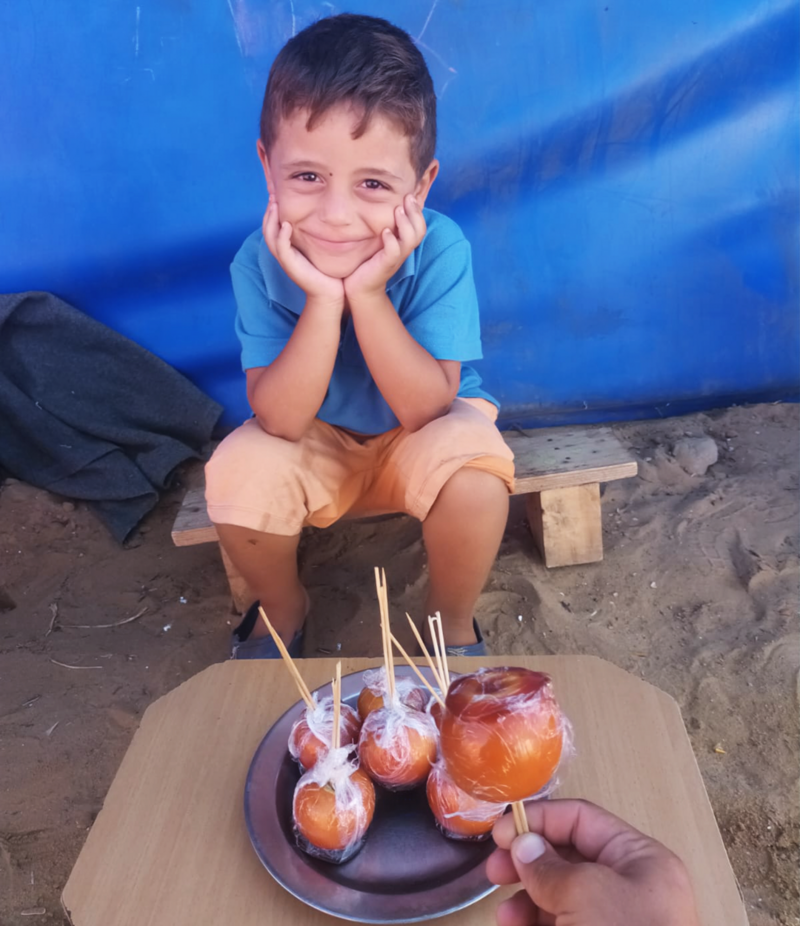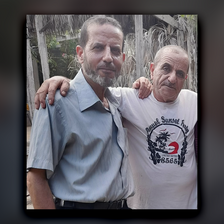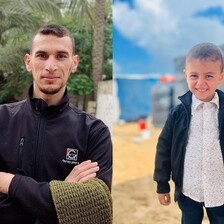The Electronic Intifada 25 October 2024

My nephew Mahmoud, 6, sells candied apples outside the family’s tent in Deir al-Balah.
It’s been over a year since I’ve been away from home. When I received a scholarship to study abroad in August 2023, my original plan was to travel for four months. But now I must stay here, far from my family in Gaza, due to the genocide.
I have three brothers and three sisters. I’m the second youngest of all my siblings (the youngest is Ahmed, who is 20) and I am an uncle to 10 nephews and nieces.
My nephew Mahmoud, 6, is particularly dear to my heart, and not only because he is my namesake. He once asked me to chastise the floor after he fell, saying, “Bad floor! How dare you hit Mahmoud!” Afterward, he asked me to go with him to buy chips and candy. He loved my stories and was always sad when he had to leave my house.
Recently, my brother Mohammed sent me a photo of Mahmoud sitting on a makeshift bench and selling anbers, or candied apples – a project that my brother devised for him to lift his spirits.
Mahmoud’s adorable smile is the same, but much has changed.
On my comfy bed, I stared at the photo for some time. Little Mahmoud looked tired, his eyes puffy. His clothes and legs were dirty. He was almost half his usual weight. I looked at his smile, and I smiled. I listened again to the voice note that came with the photo: he said he was so excited to sell candied apples to make money to help his father.
In Mahmoud’s old life, he used to worry about his crayons and toys. He didn’t like when we touched his blue Spiderman toy. He enjoyed sweets, a story and a kiss before bed.
What Mahmoud didn’t know is that, at the end of the day, the candied-apple project had not done so well. My brother had to lower the price because nobody was buying. But my brother added some money to the pot and counted it with Mahmoud at night, in the tent with a small light, and gave Mahmoud a shekel as a reward.
Missing from the scene were all the comforts Mahmoud should have: a bed, a home, a sense of safety.
In his voice note, Mahmoud cried, and I heard my brother tell him, “Don’t cry, you’re a man.” I wanted to respond: No, he’s not.
He is a child who misses his favorite candies and his blue Spiderman toy. He is tired and barefoot. He is terrified of bombs and understands that death is possible. He is trying to make sense of what is happening, as a child would: he told me that his Spiderman ran away before their house was bombed.
Instead of being in school, he works. He’s growing up in a tent, exposed to the heat and cold. He is preoccupied with how to make money and survive, where the water, food and wood will come from and how his torn flip-flop will be mended.
My brother Ahmed
My younger brother Ahmed, like Mahmoud and myself, is also a child of war.
Ahmed and I shared a bedroom for most of our lives. We fought for the corner bed, the one close to the window that would usher in more air during no-electricity hours.
We would each vie for the better half of a sandwich, the more-full cup of tea.
He preferred the lights on; I wanted them off.
We had a running rivalry over who would get to control the TV remote.
Our rivalry was a constant of our childhoods.
During my third year of college, Ahmed graduated from high school with excellent grades. But my parents, though they worked hard to support us all, still struggled financially, and they couldn’t afford to have us both in college at the same time.
My parents wanted to borrow money so he could attend college, too. But Ahmed said that he would wait.

Mahmoud misses his favorite candies and his blue Spiderman toy.
He got a job at a clothing factory, where he was on his feet for eight hours a day, doing the repetitive and grueling work of steaming clothes.
He would wake up early, help with chores and then head back to the factory.
Most days he would stumble into our bedroom exhausted, sweating from head to toe, feet swollen. I would be studying, sitting in a comfortable chair with a fan pointed in my direction, drinking coffee and grappling with Shakespearean English.
Ahmed worked for a full year.
When I left for the United States in August, Ahmed could finally enroll in college classes since I would now be on a scholarship. He was very excited about this – and, as I expected, he thrived in his classes, mostly graphic design, communications and advertising.
But the genocide began two months into his studies, and his education again was put on hold.
Everything my family had fought to build was bombed by Israel: the house, the car, our small formal wear rental shop. Ahmed and the rest of my family were forced to evacuate to Rafah, in southern Gaza, in November 2023.
“What happened to your laugh?”
Today, Ahmed takes care of my parents, as my other siblings have families of their own to tend to. He wakes in the early hours of the morning to collect firewood and then to fill water jugs. He balances heavy sacks of flour on his shoulders and walks for miles back to the tent. He sleeps on the ground so my mother can stretch her arthritic legs on the mattress.
The last time we had a video call, I saw that he wasn’t the Ahmed I knew. He had lost over 50 pounds, unable to keep on weight since he lives off canned goods and has barely had a bite of protein in a year.
He had contracted Hepatitis B. He was pale, with sunken eyes, not at all his usual laughing self. The war has consumed his body.
Still, we were able to laugh, just a bit. But I didn’t recognize his laugh. I asked him, “What happened to your laugh?”
Ahmed always had a loud laugh.
“I don’t know,” he said. “It’s not coming anymore.”
I would give up everything for my brother. I dream of him and I long for the days when we would laugh together again.
I didn’t want my brother to see me crying on the call, so I hung up quickly.
I wanted to tell him that I missed him and that his soul would shine again.
The author is a writer, photographer and video editor from Gaza.





